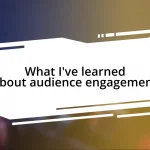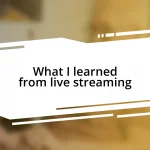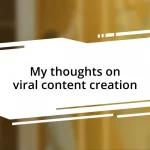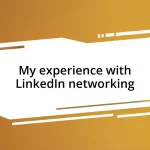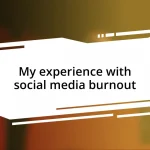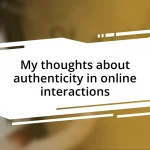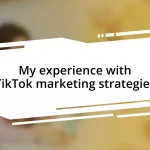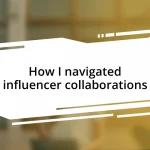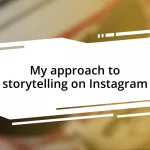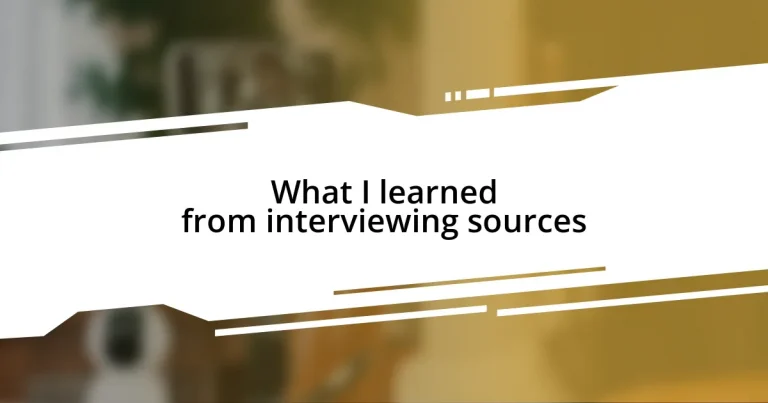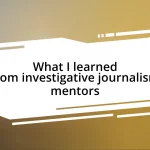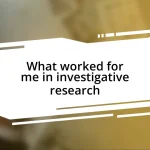Key takeaways:
- Preparation involves both mental readiness and understanding your source’s background to foster a comfortable conversation.
- Active listening and allowing for natural dialogue can lead to unexpected insights and deeper connections.
- Building rapport through personal stories and open-ended questions encourages sources to share more freely.
- Ethical considerations, such as ensuring informed consent and respecting boundaries, are crucial for building trust and fostering open exchanges.
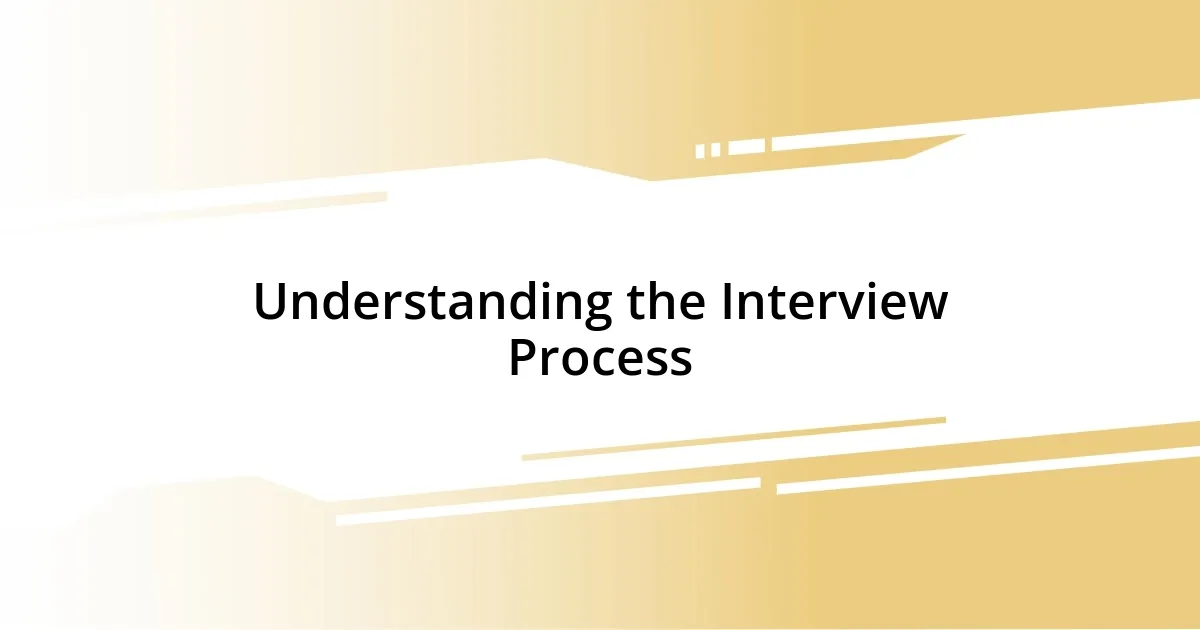
Understanding the Interview Process
Understanding the interview process is a blend of preparation, active listening, and adaptability. I still remember my first interview; I was so focused on my list of questions that I almost missed out on the true depth of the conversation. Have you ever felt that pressure to stick to a script, only to find the best insights come when you allow the dialogue to flow naturally?
Every interview is unique, and I’ve learned that the environment plays a crucial role. Once, I conducted an interview in a bustling café, and while it was noisy, the spontaneous atmosphere led to candid moments that I’d never anticipated. It made me realize: how can we create spaces that encourage genuine dialogue, despite our surroundings?
Active listening is invaluable. During a discussion with a local artist, I found that when I paused to genuinely absorb her words, she opened up about her struggles in ways I hadn’t expected. This experience taught me that sometimes, it’s not about asking the right questions, but rather about being present. How often do we rush through conversations without truly hearing what’s being said?
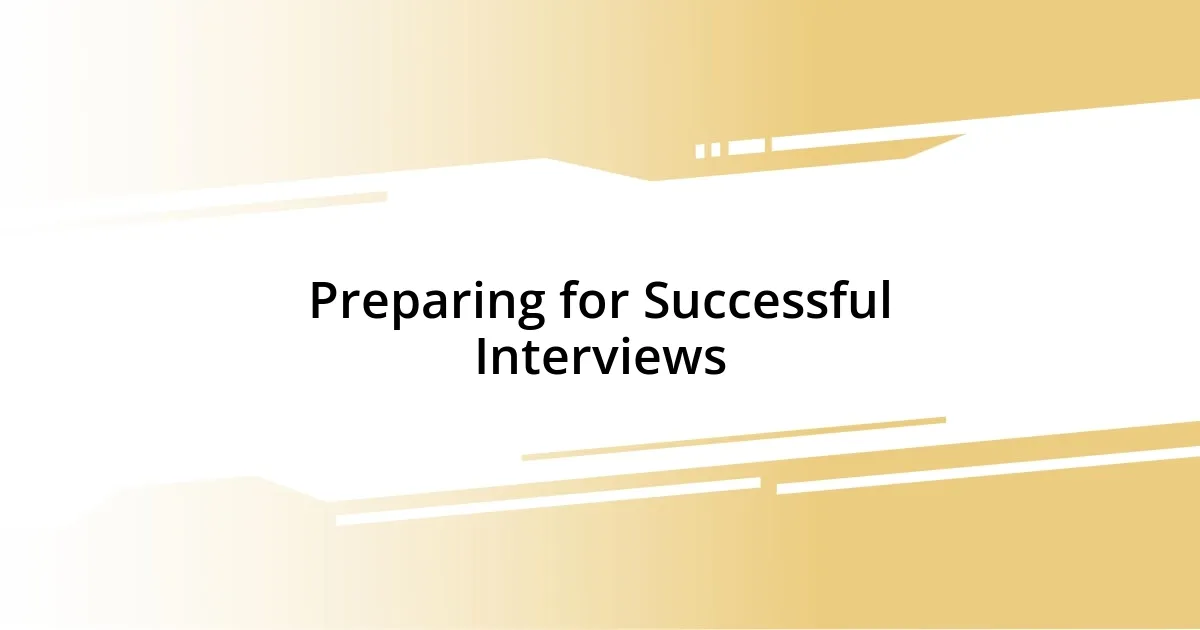
Preparing for Successful Interviews
Preparing for interviews is more than just gathering questions; it’s about creating the right mindset. I’ve learned the hard way that if I don’t feel comfortable and confident, it reflects in my interactions. I remember heading into an interview feeling rushed and unprepared, which made me fumble my questions. The energy I brought into that room affected everything. I’ve now made it a habit to prepare both my material and my mind.
Here are a few tips that have been helpful:
- Research Your Source: Understanding their background helps in crafting relevant questions.
- Practice Active Listening: Be present and engaged, just like you would in a good conversation.
- Prepare Your Environment: Choose a quiet place where both you and your source can focus.
- Be Ready for Surprises: Some of the best insights come from unplanned moments; embrace them!
- Own the Questions: Ensure your list reflects genuine curiosity rather than a rigid script.
Effective preparation can transform an interview from a simple Q&A into a dynamic exchange, revealing so much more than anticipated.
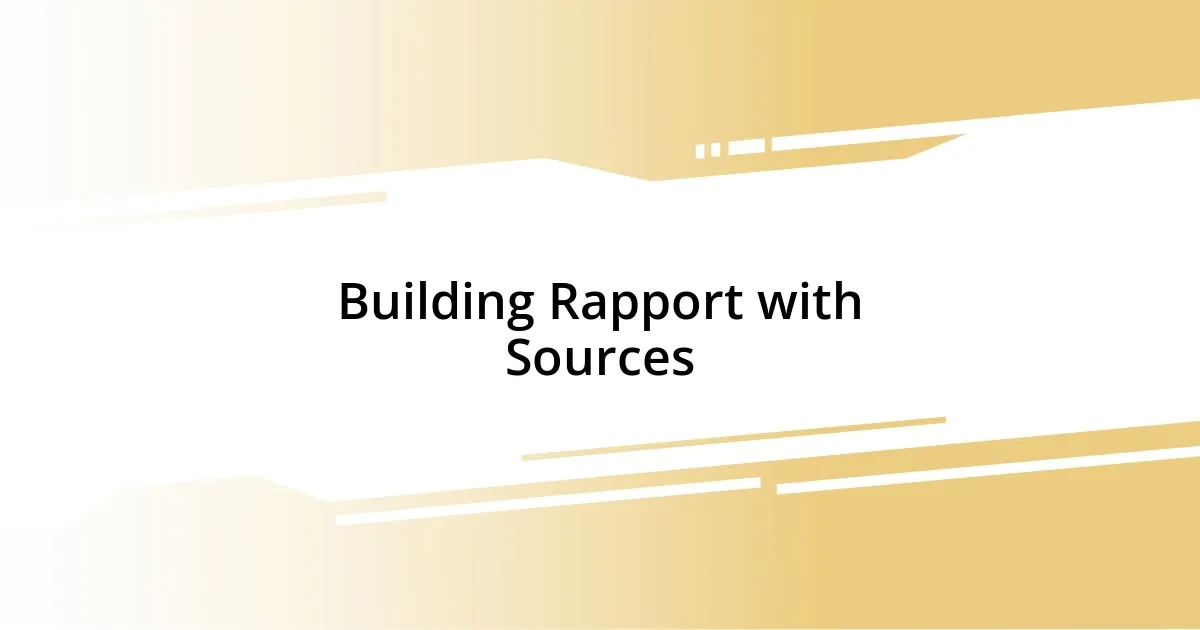
Building Rapport with Sources
Building rapport with sources is a fundamental aspect that shapes the interview experience. I vividly remember the time I interviewed a community leader who was initially guarded. Instead of diving straight into questions, I shared a personal story related to the challenges we faced in our community. This moment of vulnerability lifted the weight of formality, allowing her to open up, revealing insights about her work I never expected. Does sharing a bit of ourselves break the ice? In my experience, it often does.
I’ve also learned how important it is to be genuinely curious about your source’s perspective. During an interview with a scientist, I found that asking open-ended questions led her to share her passion, which transformed our exchange into an engaging discussion rather than a checklist of inquiries. When sources feel that their thoughts matter, they tend to relax and share more generously. Isn’t it fascinating how shifting the dynamic can unlock deeper conversations?
Creating a comfortable environment is key for building rapport. I once chose a park for an interview, which initially seemed unconventional, but as we sat beneath a tree, the casual setting encouraged my source to speak more freely. His laughter became more frequent, and he shared stories that painted a vivid picture of his experiences. Have you ever noticed how elements of our surroundings can influence the flow of conversation? I believe it’s crucial to leverage these moments to foster authentic connections.
| Effective Rapport-Building Techniques | Examples in Practice |
|---|---|
| Sharing Personal Stories | Connecting through common experiences |
| Asking Open-Ended Questions | Encouraging deeper insights and discussions |
| Choosing a Comfortable Environment | Relaxed settings lead to richer conversations |
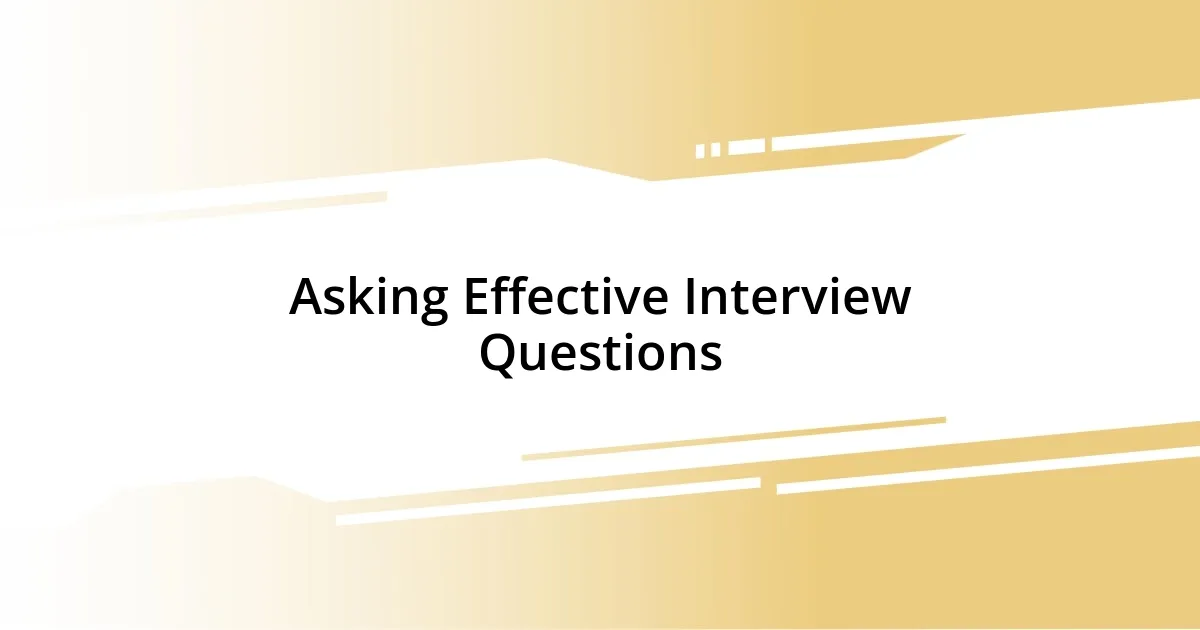
Asking Effective Interview Questions
Asking effective interview questions is an art that goes beyond simple inquiries; it’s about navigating a path to deeper understanding. I once approached an interview with a tech entrepreneur, armed with a list of standard questions. However, as I sat across from him, I realized that what I really wanted to know was his personal journey. I scrapped my list and asked him how a single moment of failure had impacted his vision. Suddenly, the conversation shifted. Have you ever noticed how asking the right question can unlock a treasure trove of insights?
Tailoring questions to your source’s experiences can transform the dialogue. During another interview, I asked a teacher about her biggest challenge. Instead of sticking to academic jargon, I framed it through the lens of her students’ growth. Her eyes lit up as she shared heartfelt stories, illustrating her passion and commitment. Isn’t it incredible how we can lead someone to reveal their true motivations just by changing our approach?
It’s equally important to embrace pauses during interviews. I remember an interview with a local artist where I deliberately sat in silence after asking a profound question. The initial discomfort faded, and in that stillness, she began to share an emotional story about her creative process. Silence can be daunting, but it often encourages our sources to dig deeper. Have you found that sometimes the most revealing insights emerge when we simply allow the conversation space to breathe?
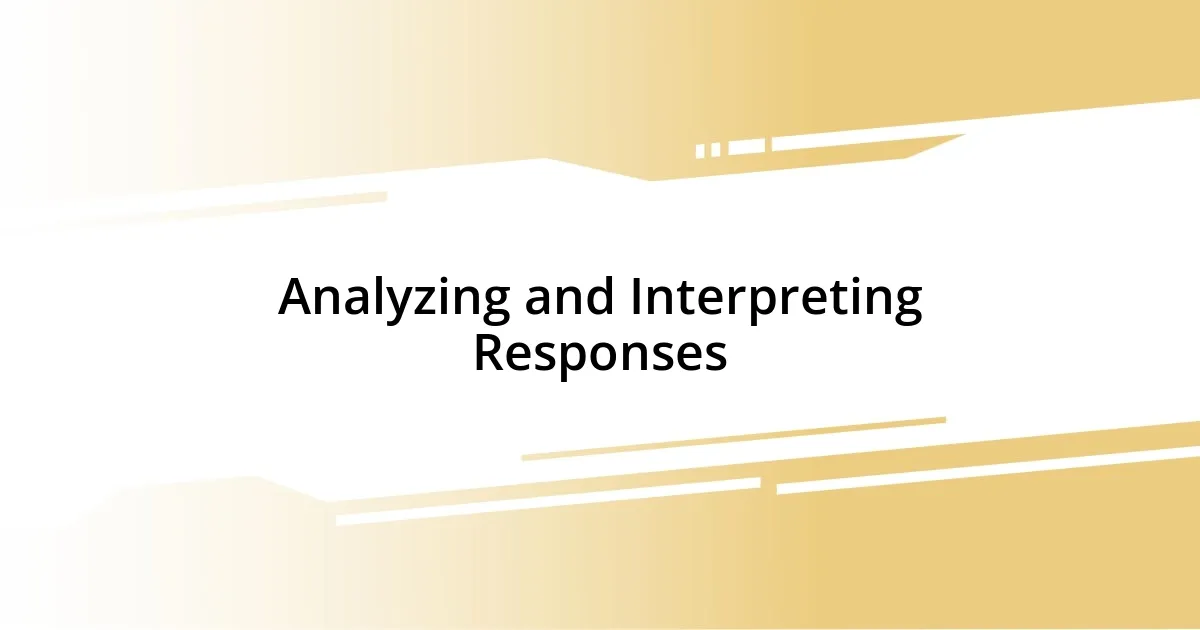
Analyzing and Interpreting Responses
Analyzing and interpreting responses is where the real magic happens in an interview. I clearly remember a time when I spoke to a local activist about her community organizing efforts. Her initial answers were straightforward, but as I probed deeper, asking her about the emotions connected to her work, the conversation shifted. Suddenly, she shared her fears and joys, which revealed layers of complexity I originally overlooked. Isn’t it amazing how digging beneath the surface can lead to transformative narratives?
When it comes to interpreting responses, context is crucial. I once interviewed a historian whose face lit up when discussing a fascinating yet tragic event in our local history. Instead of tallying facts, I analyzed the emotional weight behind her words. It turned out that the anecdote she shared was tied to her family legacy. I learned that understanding the background of a source’s experiences can significantly enrich the overall narrative. How often do we consider the stories behind the stories?
Listening actively during the conversation is paramount. I distinctly remember chatting with a musician who spoke about his journey through a difficult phase in life. I noticed that when I listened intently and reflected back key phrases, he opened up even more. His vulnerability transformed our discussion into a heartfelt exchange. I’ve realized that interpretation isn’t just about understanding the words; it’s about connecting on a human level. Have you experienced moments where genuine listening pulled someone’s true story into the light?
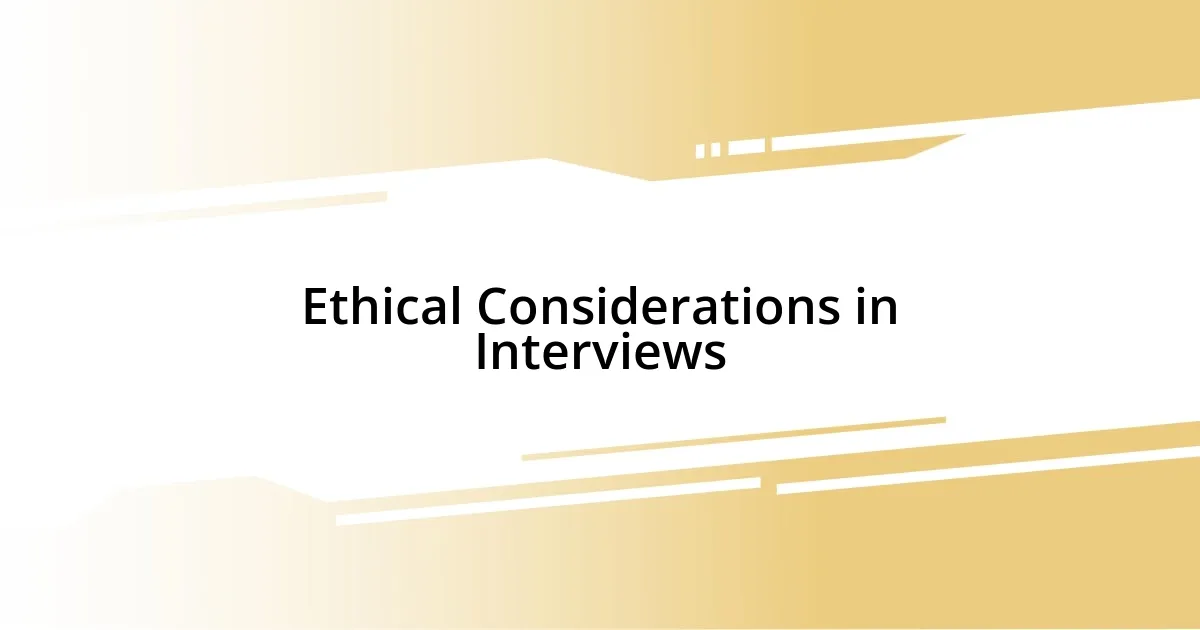
Ethical Considerations in Interviews
Ethical considerations in interviews are foundational to building trust with your sources. I once interviewed a whistleblower who shared sensitive information about workplace misconduct. It was crucial to establish a safe space where she felt comfortable revealing her experiences. I made sure to clarify how I would protect her identity and handle her information, which seemed to empower her and facilitate an open exchange. How important do you think confidentiality is in building rapport with interview subjects?
In this line of work, informed consent cannot be overlooked. I vividly remember sitting down with an elderly relative to discuss family history. I explained how I intended to use her stories and sought her permission to record our conversation. That simple act of ensuring she felt in control made a world of difference; she opened up fully, sharing stories I had never heard before. Isn’t it interesting how transparency can enhance the depth of an interview?
Lastly, respecting boundaries during interviews is paramount. There was a moment when I was chatting with a community leader about her initiatives when she suddenly hesitated, clearly uncomfortable with a line of questioning. Rather than pressing on, I pivoted to a different topic, acknowledging her discomfort. This taught me that recognizing and respecting the emotional limits of your sources not only maintains ethical standards but enriches the information they are willing to share. Have you ever had to navigate sensitive emotions in an interview?
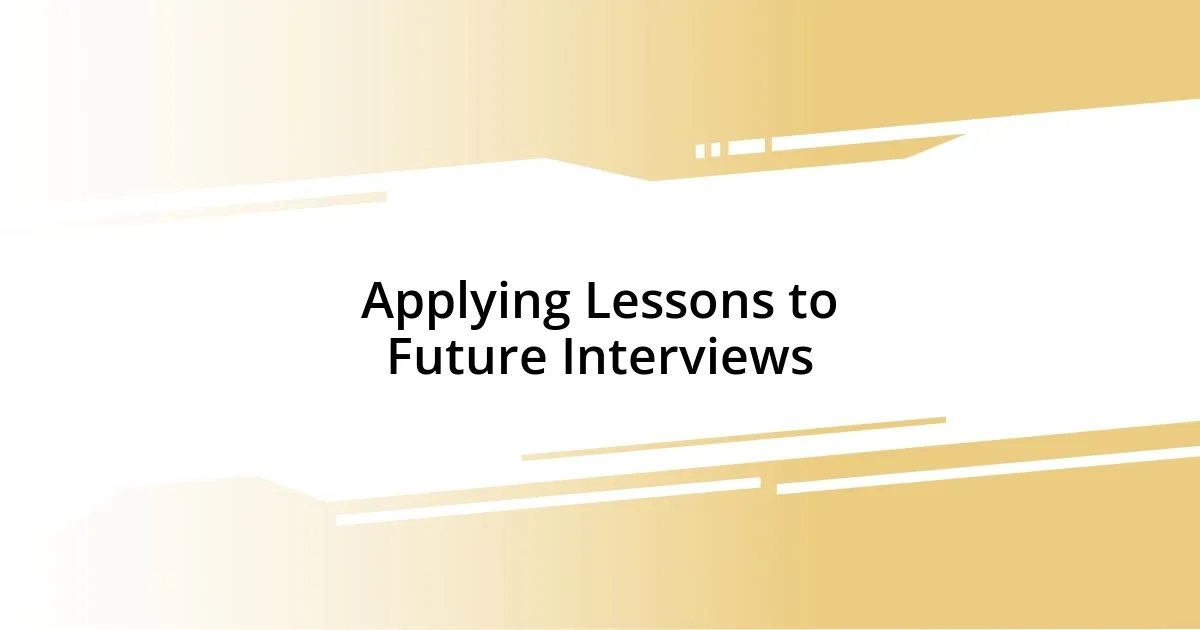
Applying Lessons to Future Interviews
Applying the lessons from past interviews has drastically changed how I approach each new conversation. For instance, during a recent talk with a tech entrepreneur, I employed my newfound understanding of emotional resonance. Instead of sticking solely to surface-level questions, I asked him about the motivations behind his innovative ideas, and he passionately shared the personal experiences that drove his vision. Isn’t it fascinating how diving deeper can unveil a source’s true inspiration?
Keeping ethical considerations at the forefront is something I now prioritize aggressively. Last month, I interviewed a survivor of a natural disaster, and I was acutely aware of the sensitive nature of her story. By ensuring she understood how her experiences would be treated and emphasizing her control over the narrative, I noticed her hesitance fade. That moment highlighted just how crucial it is to protect a source’s vulnerability while fostering an environment of trust. Have you ever felt the weight of someone’s story while navigating their emotional landscape?
Moreover, active listening has become a hallmark of my interviews. I remember speaking to a local chef about his culinary journey, and as he spoke about his struggles in the industry, I spontaneously mirrored his feelings back to him. “It sounds like you faced some real obstacles keeping your passion alive,” I said, and his eyes sparkled with gratitude. That acknowledgment opened a floodgate of memories he was eager to share. This experience taught me just how powerful it can be to genuinely reflect on what a source expresses. How often do we miss these moments by simply waiting for our turn to speak?
